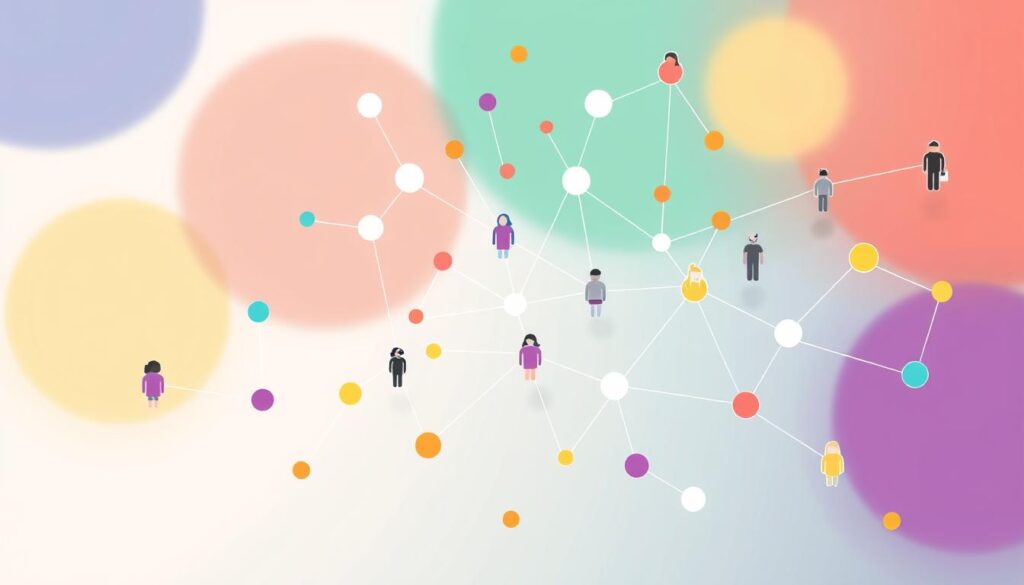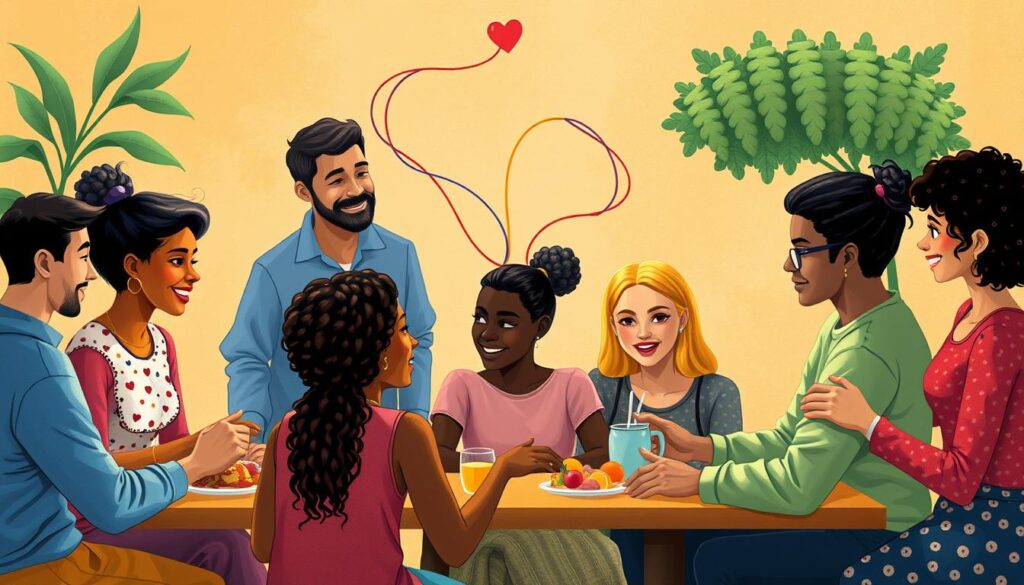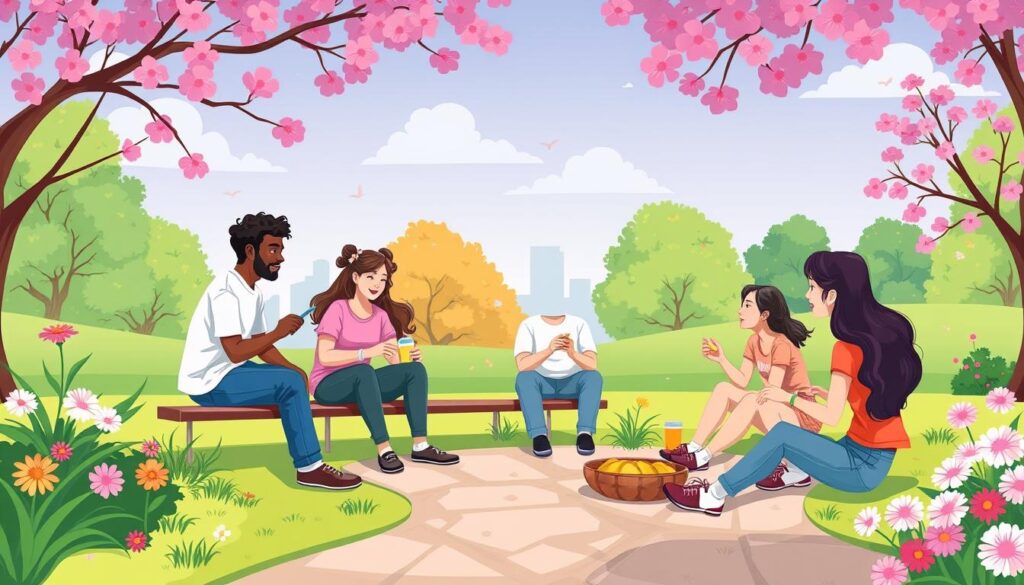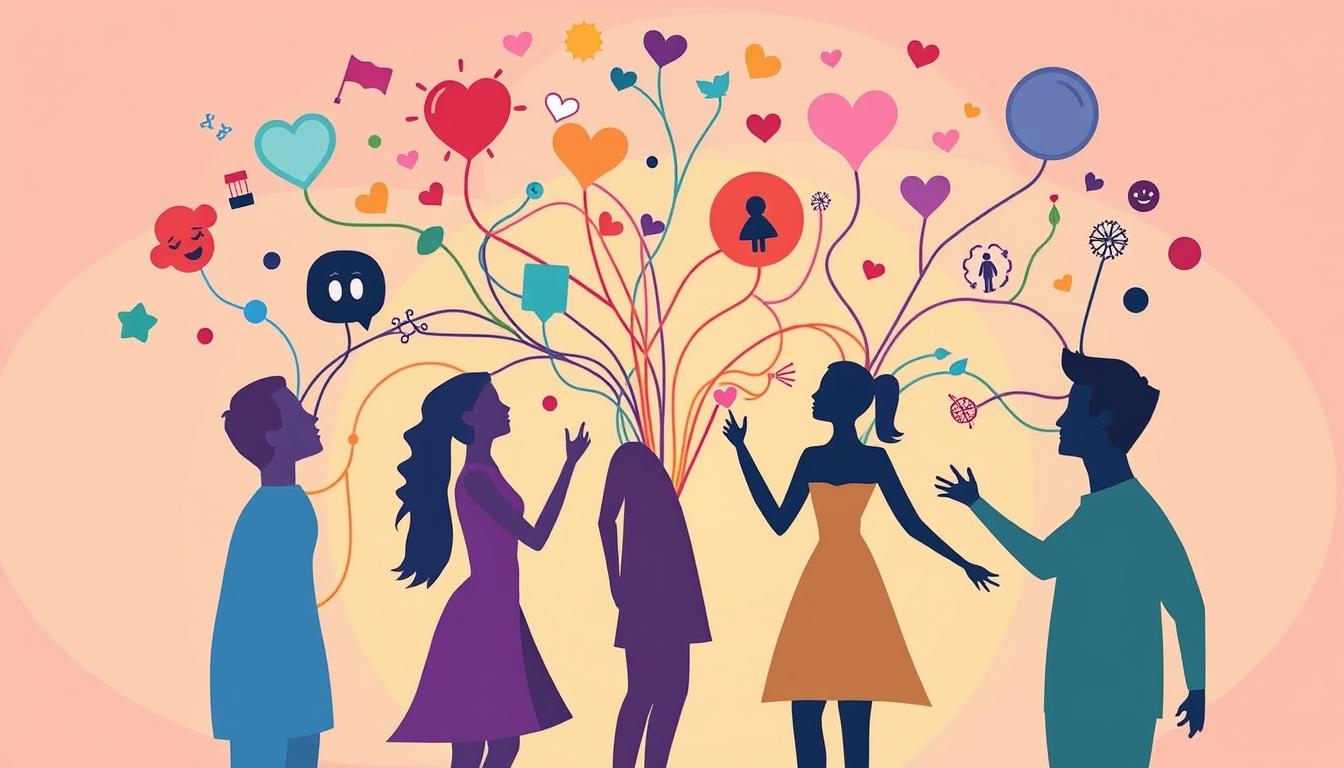Friendship is a key part of being human, deeply shaping our lives. This article dives into the science of friendship. It looks at the psychological reasons, the ways we connect with others, and the benefits of strong friendships.
It covers how attachment theory and empathy help us form bonds. It also talks about how friendships affect our mental and physical health. This guide aims to help readers understand the science behind friendships.
Key Takeaways
- Friendship is a crucial part of the human experience, influencing our lives in significant ways.
- The science of friendship explores the psychological foundations, social dynamics, and benefits of interpersonal connections.
- Attachment theory and emotional intelligence play key roles in the formation and maintenance of friendships.
- Strong social ties can have a positive impact on mental and physical well-being.
- Understanding the science of friendship can help individuals cultivate and nurture meaningful relationships.
Forming Bonds: The Psychological Underpinnings of Friendship
Creating lasting friendships is deeply connected to our psychology. Key factors include attachment theory and the importance of empathy and emotional intelligence.
Attachment Theory and Early Relationships
Attachment theory shows that our early bonds with caregivers shape our friendships later. How we bond with our caregivers in childhood affects our friendship formation as adults.
Those who had secure attachments in childhood tend to form close friendships more easily. They are more trusting, empathetic, and open to intimacy. These traits are vital for strong friendships.
The Role of Empathy and Emotional Intelligence
Emotional intelligence helps us deal with friendship’s complex emotions. People with high emotional intelligence have better social skills. This helps in building and keeping meaningful friendships.

“The greatest gift of human beings is that we have the power of empathy, we can all share feelings.” – Meryl Streep
Understanding the psychology behind friendship formation gives us insights into our closest bonds. It enriches our social lives and overall happiness.
Interpersonal Connections: The Building Blocks of Social Networks
Friendships don’t stand alone; they’re part of a larger network of interpersonal connections. These connections shape our social lives, influencing our experiences and well-being. Understanding friendship dynamics helps us see how social structures affect us every day.
Our social networks start with the relationships we build. These interpersonal connections can come from shared interests or chance meetings. As we move through these social spaces, we create a complex web of relationships.
The strength of our interpersonal connections greatly affects our access to resources and opportunities. Strong ties can open doors and provide support. But weaker connections might limit our exposure to new things. Knowing how our social networks work helps us navigate our social lives better.

“The quality of our relationships is the single most important factor in determining the quality of our lives.”
Exploring the science of friendship shows us that these interpersonal connections are more than just individual bonds. They form complex systems that guide our personal and professional paths. By nurturing strong, meaningful relationships, we can tap into the power of our social networks to improve our well-being and growth.
The Science of Friendship: Understanding the Dynamics
Friendship is complex, involving communication, emotional bonds, and solving conflicts. By studying these aspects, we learn what makes friendships strong and lasting.
Communication Patterns and Friendship Quality
The quality of a friendship depends a lot on how well friends talk to each other. Good communication means listening well, understanding each other, and discussing tough topics openly. Studies show that friendships with open communication are stronger and last longer.
Conflict Resolution and Friendship Maintenance
Even the best friendships face disagreements. How these are solved can make or break the friendship. Using strategies like compromise and listening helps friends overcome problems and keep their bond strong.
“Friendship is a sheltering tree.” – Samuel Taylor Coleridge
It’s key to understand how friends communicate, the quality of their friendship, and how to solve conflicts. By diving into these topics, we can build better, more rewarding friendships that add joy to our lives.

Fostering Relationships: The Art of Nurturing Friendships
Building lasting friendships takes effort and understanding. At its core are active listening and emotional support. These skills help grow friendships and create a network of meaningful connections.
Active Listening and Emotional Support
Active listening is key to strong friendships. It means fully focusing on the other person, getting their view, and responding with empathy. This creates a space of trust and openness, where sharing feelings is safe.
Offering emotional support is also crucial. A supportive friend provides a listening ear, comfort, and encouragement. This support strengthens the bond and makes friends feel they belong together.
“Friendship is born at that moment when one person says to another, ‘What! You too? I thought I was the only one.'” – C.S. Lewis
By focusing on active listening and emotional support, we can deepen our friendships. This leads to a network that fosters resilience, inspires growth, and nourishes the soul. Learning to nurture friendships unlocks the power of human connection.

Social Psychology: Exploring the Benefits of Friendship
Friendship is more than just knowing someone. It’s a deep and complex part of our lives. Research in social psychology shows how strong friendships can boost our well-being. This includes better mental and physical health.
Improved Mental Health and Well-being
Many studies show that friends can make us happier and more fulfilled. People with good friends often feel less stressed and anxious. Friends offer emotional support and a sense of belonging. This helps us face life’s ups and downs with more positivity and strength.
Physical Health Benefits of Strong Social Ties
But friends are good for more than just our minds. Strong friendships can also improve our physical health. Friends can help lower the risk of serious diseases like heart disease. They might even help us live longer.
This is because friends help us manage stress and stay healthy. They encourage us to live better lifestyles. By understanding how friends impact our lives, we can make choices to keep our friendships strong. This can greatly improve our mental and physical health.
Maintaining Friendships: Overcoming Challenges and Obstacles
Friendships face unique challenges over time. It’s key to know how to handle these issues to keep strong bonds. This section talks about common problems and how to solve them, helping you keep your friendships alive.
One big challenge is when friends move far apart. Technology helps a lot, with video calls and online games. It’s important to find new ways to stay close, even when you can’t meet in person.
Another issue is when friends’ lives get busy. Schedules can clash, leaving little time for each other. It’s crucial to make time for your friends. Set aside moments for fun activities that both enjoy.
- Maintain open and honest communication to address any challenges that arise.
- Be flexible and understanding when life circumstances change.
- Embrace new ways of staying connected, such as virtual hangouts or shared hobbies.
- Prioritize quality time together, even if it means making sacrifices in other areas.
By understanding common friendship challenges and using good strategies, you can keep your friendships strong. This way, you can enjoy your friendships for many years.
“The greatest gift of life is friendship, and I have received it.” – Hubert H. Humphrey
Friendship Theories: Exploring Different Perspectives
Many theories have emerged to study friendship. Each one offers its own view on these special bonds. From evolutionary theories that look at friendship’s biological roots to sociological views on how culture shapes friendships, researchers dive deep into these connections.
Evolutionary Theories of Friendship
Evolutionary theories say friendships evolved to help us survive and thrive. They believe that by forming close groups, we could better access resources and help each other out. This helped our ancestors face the world’s challenges together.
Sociological Approaches to Friendship Formation
Sociologists, on the other hand, focus on how culture and environment shape friendships. They look at how things like shared interests and where we live affect our friendships. They also study how friendships change over time and across different cultures.
By looking at all these theories, we can better understand the complex world of friendships. Whether it’s the evolutionary roots or the social influences, studying friendship theories helps us see how we connect with others.
The Science of Friendship Research: Past, Present, and Future
The study of friendship has a rich history. It has seen many groundbreaking studies. These studies have greatly increased our understanding of friendship.
From early psychologists to today’s researchers, the field has grown. It now shows how psychological, social, and cultural factors affect our friendships.
Landmark Studies and Findings
The Dunedin Multidisciplinary Health and Development Study is a key example. It followed people from birth to adulthood. This study showed how early life shapes our friendships later on.
Debra Lieberman’s work also made a big impact. She found that our ability to make friends may come from our ancestors. Social connections helped them survive and reproduce.
Emerging Areas of Research and Future Directions
New areas of study are emerging in friendship research. One is how digital technologies change friendships. Social media and online chats have changed how we connect.
Another area is looking at how different cultures view friendships. By studying this, researchers can understand more about friendship worldwide. This helps us see both common and unique aspects of friendship.
“The ultimate test of a moral society is the kind of world that it leaves to its children.” – Dietrich Bonhoeffer
As we learn more about friendship, we’ll understand it better. Insights from past and present studies will help us see the importance of friendships. By studying friendship, we can appreciate its role in our lives and the world.
Friendship Dynamics: The Influence of Culture and Diversity
Friendship is a universal human experience, yet it is shaped by culture and society. As we explore friendship dynamics, we see how cultural influences and diversity affect these connections.
Factors like gender, race, ethnicity, and socioeconomic status impact friendships. For example, some cultures favor same-gender friendships, while others encourage cross-gender ones. The value placed on family, community, and individual freedom also influences friendships.
“Friendships are not just personal connections, but also reflections of the broader social and cultural landscapes in which they occur.”
Understanding cultural factors and diversity in friendship dynamics enriches our view of human connections. This knowledge helps us build more inclusive relationships. It breaks down barriers and celebrates individual experiences.
Exploring the science of friendship shows us that it’s shaped by culture and society. Embracing this diversity fosters empathy and inclusivity in our understanding of humanity.
Friendship in the Digital Age: The Impact of Technology
The 21st century has changed how we make and keep friends. Technology and digital communication have greatly affected our friendships. This section will look at how social media, messaging apps, and other digital tools have changed friendships today.
The digital age has brought a new way to connect with friends. Social media platforms let people connect with friends, no matter where they are. These online spaces are where people share experiences, get emotional support, and feel part of a community.
But technology also brings challenges to friendships. The constant flow of digital messages can make people feel alone. Trying to keep up a perfect online image can also make friendships less real.
Yet, technology also offers ways to strengthen friendships. Messaging apps and video calls help friends stay close, even when they’re far apart. Online activities like virtual game nights or book clubs also help friends bond and share experiences.
Finding a balance between technology and real-life interactions is key. Understanding how technology affects friendships helps us use digital tools wisely. This way, we can keep our friendships deep and true.
The Future of Friendship: Emerging Trends and Implications
Friendship is changing, and it’s important to look at new trends and what they mean for us. Technology, social changes, and psychology research are all playing a part. They will shape how we make and keep friends in the future.
Digital platforms are making a big impact on how we connect. Social media and other tech tools are changing how we form and keep friendships. Researchers are studying how these tools affect the quality and depth of our friendships.
Also, society is changing, with more diversity and global connections. These changes might alter how we make and keep friends. Experts are looking into how these shifts could impact our well-being and the strength of our communities.
- Forming Bonds: The Psychological Underpinnings of Friendship
- Interpersonal Connections: The Building Blocks of Social Networks
- The Science of Friendship: Understanding the Dynamics
- Fostering Relationships: The Art of Nurturing Friendships
- Social Psychology: Exploring the Benefits of Friendship
- Maintaining Friendships: Overcoming Challenges and Obstacles
- Friendship Theories: Exploring Different Perspectives
- The Science of Friendship Research: Past, Present, and Future
- Friendship Dynamics: The Influence of Culture and Diversity
- Friendship in the Digital Age: The Impact of Technology
- The Future of Friendship: Emerging Trends and Implications

شركة Bwer هي أحد الموردين الرئيسيين لموازين الشاحنات ذات الجسور في العراق، حيث تقدم مجموعة كاملة من الحلول لقياس حمولة المركبات بدقة. وتغطي خدماتها كل جانب من جوانب موازين الشاحنات، من تركيب وصيانة موازين الشاحنات إلى المعايرة والإصلاح. تقدم شركة Bwer موازين شاحنات تجارية وموازين شاحنات صناعية وأنظمة موازين جسور محورية، مصممة لتلبية متطلبات التطبيقات الثقيلة. تتضمن موازين الشاحنات الإلكترونية وموازين الشاحنات الرقمية من شركة Bwer تقنية متقدمة، مما يضمن قياسات دقيقة وموثوقة. تم تصميم موازين الشاحنات الثقيلة الخاصة بهم للبيئات الوعرة، مما يجعلها مناسبة للصناعات مثل الخدمات اللوجستية والزراعة والبناء. سواء كنت تبحث عن موازين شاحنات للبيع أو الإيجار أو التأجير، توفر شركة Bwer خيارات مرنة لتناسب احتياجاتك، بما في ذلك أجزاء موازين الشاحنات والملحقات والبرامج لتحسين الأداء. بصفتها شركة مصنعة موثوقة لموازين الشاحنات، تقدم شركة Bwer خدمات معايرة موازين الشاحنات المعتمدة، مما يضمن الامتثال لمعايير الصناعة. تشمل خدماتها فحص موازين الشاحنات والشهادات وخدمات الإصلاح، مما يدعم موثوقية أنظمة موازين الشاحنات الخاصة بك على المدى الطويل. بفضل فريق من الخبراء، تضمن شركة Bwer تركيب وصيانة موازين الشاحنات بسلاسة، مما يحافظ على سير عملياتك بسلاسة. لمزيد من المعلومات حول أسعار موازين الشاحنات، وتكاليف التركيب، أو لمعرفة المزيد عن مجموعة موازين الشاحنات ذات الجسور وغيرها من المنتجات، تفضل بزيارة موقع شركة Bwer على الإنترنت على bwerpipes.com
Hi there,
We run a YouTube growth service, which increases your number of subscribers both safely and practically.
– We guarantee to gain you 700-1500+ subscribers per month.
– People subscribe because they are interested in your channel/videos, increasing likes, comments and interaction.
– All actions are made manually by our team. We do not use any ‘bots’.
The price is just $60 (USD) per month, and we can start immediately.
If you have any questions, let me know, and we can discuss further.
Kind Regards,
Amelia
Hi,
We’d like to introduce to you our explainer video service, which we feel can benefit your site siyasisawaal.com.
Check out a couple of our existing videos here:
https://www.youtube.com/watch?v=bA2DyChM4Oc
https://www.youtube.com/watch?v=JG33_MgGjfc
Our prices start from as little as $195 and include a professional
script and voice-over. We also provide other accents and non-English languages.
If this is something you would like to discuss further, don’t hesitate to reply.
Kind Regards,
Joanna